人教版英语选修六Unit2
- 格式:ppt
- 大小:2.21 MB
- 文档页数:35
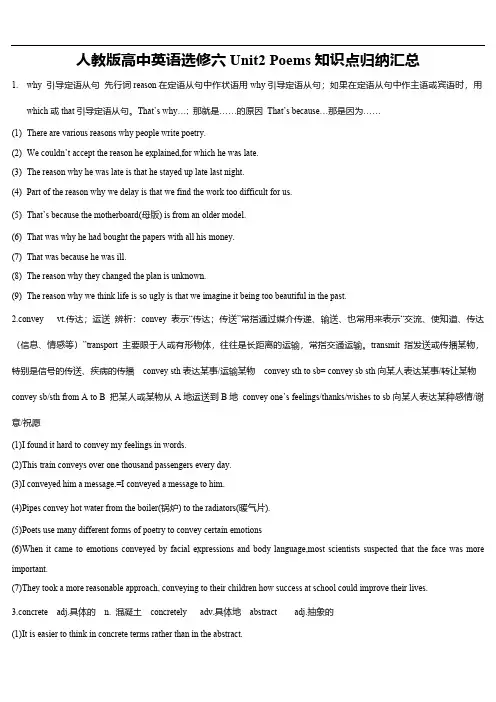
人教版高中英语选修六Unit2 Poems知识点归纳汇总1.why 引导定语从句先行词reason在定语从句中作状语用why引导定语从句;如果在定语从句中作主语或宾语时,用which或that引导定语从句。
That’s why…; 那就是……的原因That’s because…那是因为……(1)There are various reasons why people write poetry.(2)We couldn’t accept the reason he explained,for which he was late.(3)The reason why he was late is that he stayed up late last night.(4)Part of the reason why we delay is that we find the work too difficult for us.(5)That’s because the motherboard(母版) is from an older model.(6)That was why he had bought the papers with all his money.(7)That was because he was ill.(8)The reason why they changed the plan is unknown.(9)The reason why we think life is so ugly is that we imagine it being too beautiful in the past.2.convey vt.传达;运送辨析:convey 表示“传达;传送”常指通过媒介传递、输送、也常用来表示“交流、使知道、传达(信息、情感等)”transport 主要限于人或有形物体,往往是长距离的运输,常指交通运输。
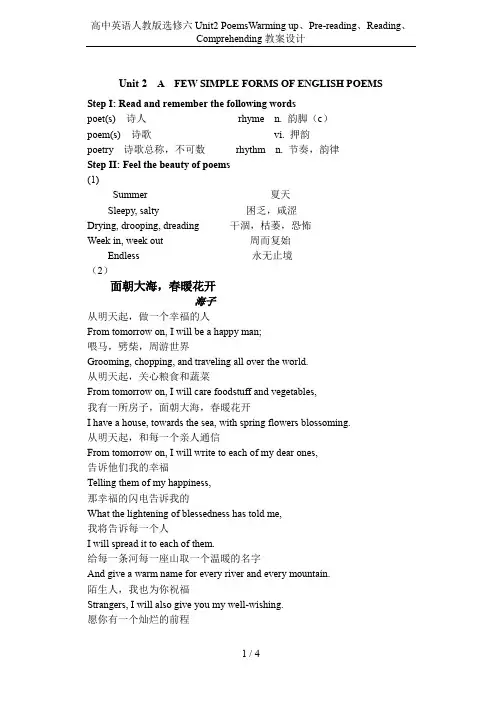
Unit 2 A FEW SIMPLE FORMS OF ENGLISH POEMSStep I: Read and remember the following wordspoet(s) 诗人rhyme n. 韵脚(c)poem(s) 诗歌vi. 押韵poetry 诗歌总称,不可数rhythm n. 节奏,韵律Step II: Feel the beauty of poems(1)Summer 夏天Sleepy, salty 困乏,咸涩Drying, drooping, dreading 干涸,枯萎,恐怖Week in, week out 周而复始Endless 永无止境(2)面朝大海,春暖花开海子从明天起,做一个幸福的人From tomorrow on, I will be a happy man;喂马,劈柴,周游世界Grooming, chopping, and traveling all over the world.从明天起,关心粮食和蔬菜From tomorrow on, I will care foodstuff and vegetables,我有一所房子,面朝大海,春暖花开I have a house, towards the sea, with spring flowers blossoming.从明天起,和每一个亲人通信From tomorrow on, I will write to each of my dear ones,告诉他们我的幸福Telling them of my happiness,那幸福的闪电告诉我的What the lightening of blessedness has told me,我将告诉每一个人I will spread it to each of them.给每一条河每一座山取一个温暖的名字And give a warm name for every river and every mountain.陌生人,我也为你祝福Strangers, I will also give you my well-wishing.愿你有一个灿烂的前程May you have a brilliant future!愿你有情人终成眷属May you lovers eventually become spouse!愿你在尘世获得幸福May you enjoy happiness in this earthly world!我只愿面朝大海,春暖花开I only wish to face the sea, with spring flowers blossoming.(3)望夫石唐王健望夫处,江悠悠。
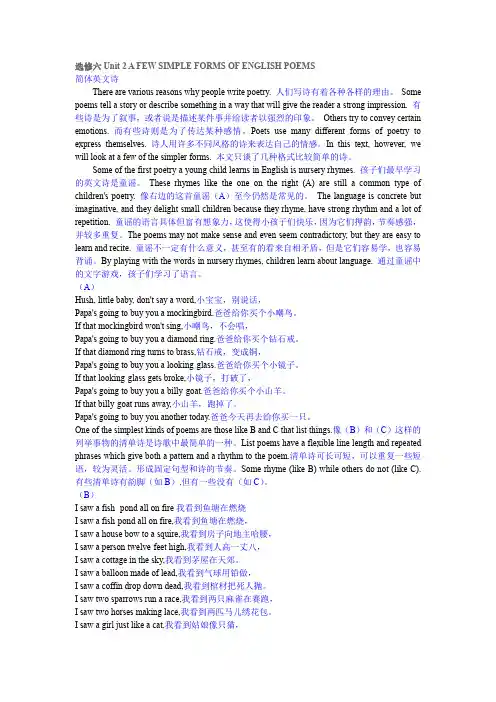
选修六Unit 2 A FEW SIMPLE FORMS OF ENGLISH POEMS简体英文诗There are various reasons why people write poetry. 人们写诗有着各种各样的理由。
Some poems tell a story or describe something in a way that will give the reader a strong impression. 有些诗是为了叙事,或者说是描述某件事并给读者以强烈的印象。
Others try to convey certain emotions. 而有些诗则是为了传达某种感情。
Poets use many different forms of poetry to express themselves. 诗人用许多不同风格的诗来表达自己的情感。
In this text, however, we will look at a few of the simpler forms. 本文只谈了几种格式比较简单的诗。
Some of the first poetry a young child learns in English is nursery rhymes. 孩子们最早学习的英文诗是童谣。
These rhymes like the one on the right (A) are still a common type of children's poetry. 像右边的这首童谣(A)至今仍然是常见的。
The language is concrete but imaginative, and they delight small children because they rhyme, have strong rhythm and a lot of repetition. 童谣的语言具体但富有想象力,这使得小孩子们快乐,因为它们押韵,节奏感强,并较多重复。
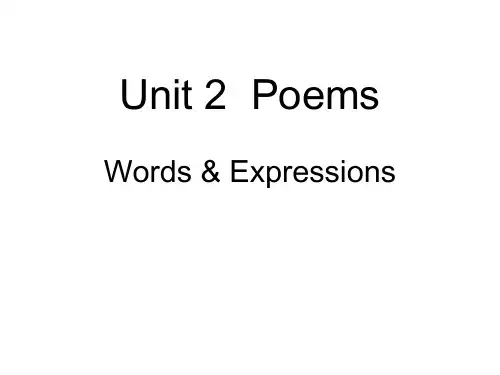
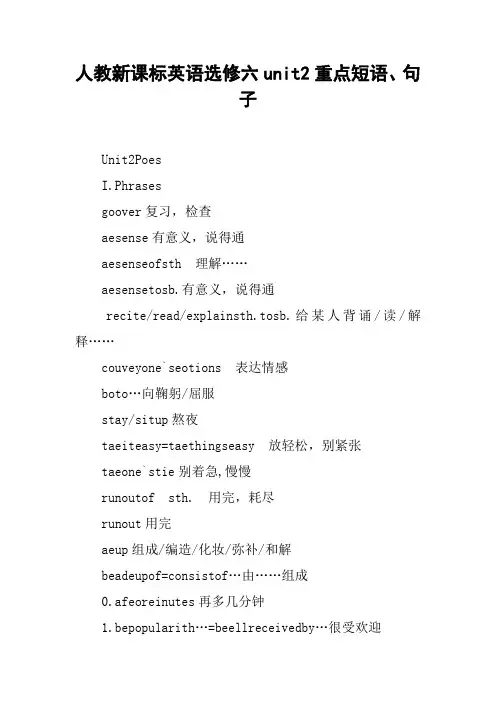
人教新课标英语选修六unit2重点短语、句子Unit2PoesI.Phrasesgoover复习,检查aesense有意义,说得通aesenseofsth 理解……aesensetosb.有意义,说得通recite/read/explainsth.tosb.给某人背诵/读/解释……couveyone`seotions 表达情感boto…向鞠躬/屈服stay/situp熬夜taeiteasy=taethingseasy 放轻松,别紧张taeone`stie别着急,慢慢runoutof sth. 用完,耗尽runout用完aeup组成/编造/化妆/弥补/和解beadeupof=consistof…由……组成0.afeoreinutes再多几分钟1.bepopularith…=beellreceivedby…很受欢迎bebrifulof=befullof…充满3.translateAintoB 把A翻译成Beein,eeout一周又一周daybyday一天又一天onandon继续不停地bychance/accident碰巧holdon继续/别挂断belielytodosth.有可能…..tryout试验tryon试穿0.letout泄漏/发出/释放/放宽1.looforardto盼望II.SentencesTherearevariousreasonshypeopleritepoetry.Soepoestel lastoryordescribesoethinginaaythatillgivethereadera strongipression.otherstrytoconveycertaineotions.人们写诗有各种各样的原因。
有些诗是为了叙事,或描叙某事给读者以强烈的印象。
而有些是为了传达某种感情。
Theydelightsallchildrenbecausetheyhavestrongrhyeand rhythandhavealotofrepetition.这些童谣能使孩子们快乐,因为它们节奏感强,又押韵,而且重复多遍。
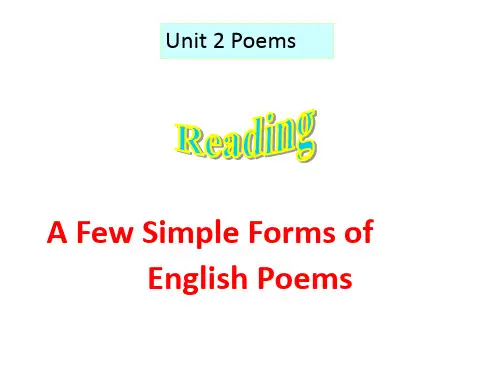

人教版高中英语选修6《Unit 2 Poem s》教案2篇Teaching plan of unit 2 Poems编订:JinTai College人教版高中英语选修6《Unit 2 Poems》教案2篇前言:英语作为在许多国际组织或者会议上都是必需语言,几乎所有学校选择英语作为其主要或唯一的外语必修课。
英语教学涉及多种专业理论知识,包括语言学、第二语言习得、词汇学、句法学、文体学、语料库理论、认知心理学等内容。
本教案根据英语课程标准的要求和教学对象的特点,将教学诸要素有序安排,确定合适的教学方案的设想和计划、并以启迪发展学生智力为根本目的。
便于学习和使用,本文档下载后内容可按需编辑修改及打印。
本文简要目录如下:【下载该文档后使用Word打开,按住键盘Ctrl键且鼠标单击目录内容即可跳转到对应篇章】1、篇章1:人教版高中英语选修6《Unit 2 Poems》教案2、篇章2:人教版高中英语选修6《Unit 2 Poems》教案篇章1:人教版高中英语选修6《Unit 2 Poems》教案教学准备教学目标教学目标(Teaching Aims)知识与技能(Knowledge and Skills)1.了解教学大纲关于语法填空的命题特点。
2.能够根据语法填空的命题特点自己编语法填空的题目3.掌握语法填空的解题方法与技巧过程与方法(Process and Methods)让每一位同学都能参与到课堂教学与活动中来,以小组或结对的形式进行相互学习和讨论。
情感态度与价值观(Feeling, Attitudes and Values)学习应对语法填空是与课文相结合,让学生在了解各种不同诗歌形式的背景下学习语法填空的设题与解题特点,从而更加理解英语诗歌的特色,更加懂得如何阅读和欣赏英语诗歌。
教学重难点教学重点(Important Points):1.让学生了解语法填空的命题特点2.掌握语法填空的解题方法与技巧教学难点(Difficult Points):语法填空中词性的转换教学过程(Teachers’ Activities)Step I: Lead-in① Review the new words and expressions of this unit by them together, and then do Task 1---speak out the other forms according to the giv en words② Listen to the song Jingle Bells and try tofill a word into each blank.Step II : Pre-practising1.Questions① Do you think it is difficult to complete the items of blank-filling with grammar knowledge?② Have you figur ed out the characteristics of the item?2.ExplainingIn this item there are 10 blanks for you to fill in with less than one proper word① some blanks with a given word while otherswith none② fill in the blanks with the proper form of the given word according to its grammatical and logical meaning.③ choose a preposition, pronoun, conjunction or an article to fill in the blank without any given word.3.DiscussionHow can we finish the items step by step with our grammar knowledge?① ___________________________________________.② _ __________________________________________.③ ___________________________________________.Step III : While-practising1.Making an item of grammatical blank-filling based on the para graph of the text.① more than 5 blanks.② some blanks with given word.③ others with none.2.exchange the item you made for your partner to complete it .3.The whole class finis h the one the teacher prepared for them.Step IV : Post-practising1.Check some of the students’ anwsers and give comments.2.Draw a conclusionStep V: Homework Assign ment1.Further improve your skills of dealing with the grammar filling.plete Ex.2 on Page 10, Nanfang New Class篇章2:人教版高中英语选修6《Unit 2 Poems》教案【按住Ctrl键点此返回目录】教学准备教学目标Teaching goals1.Target languagea. Important words and phrasesPoem, poetry, recite, aspect, convey, nursery, rhyme, diamond, cottage, balloon, sparrow, tease, salty, endless, translate, nursery rhyme, take it easy, run out of, make up ofb. Important sentencesWhich poem is about things that don’t make sense?Poets use many different forms of poems toexpress themselves.I hadn’t taken my eye off the ball.We hadn’t taken it easy.The poem is made up of five lines.A lot of Tang poetry has been translated into English. The translations have a free form that English people like to copy.2.Ability goalsa. Enable Ss to talk about different types of poems: nursery rhymes; list poems; cinquain,; haiku; Tang poemsb. Enable Ss to talk about different purposes of writing poems.c. Understand the main theme of each poem.d. Enable Ss to chant some of their favorite poems.3.Learning abilityEnable Ss to distinguish different types of poems 教学重难点Teaching important points1.Talk about five main types of poems.2.Understand the main purpose of writing the poems.Teaching difficult points1.Find the rhythm of each poem.2.Chant the poem.3.Understand the main purpose of writing the poems.教学过程Teaching procedures to share a feeling or experience; to describe something in detail or give an impression; to get the reader to think about an idea; to express a point of view; to make the reader experience the sight, sounds, smells, feel and tastes of something; to create a mood, to play with words--- their sounds, rhyme and rhythm.)If time permits, in small groups or as a class, discuss the kinds of topics that poets write about.( people, animals, nature, landscapes, the sea, the seasons, stories, death, war, youth and old age,feeling and experiences, emotions like love, hate, sadness, regret and desire, etc.)Step 4.Pre-readingPeople from different countries write different kinds of poems. Get Ss to discuss the questions on Page 9 with their partners: Do you have a favorite poem in Chinese? Why ? Do you have a favorite poem in English? Why?As to exercise 2, give Ss practice in animportant reading skill: scanning a text, that is, looking through a text quickly to find specific information. Read the table in exercise 2 with the Ss. Tell them that they are going to look for the information in the table, just in the poems themselves, not in the other parts of the text. They are to look only for those pieces of information and not readevery word. Do an example with them.Suggested answers to exercise 2:Step 5.ReadingScanningGet the Ss to read the passage quickly and accurately and meanwhile help the Ss to form a good habit of reading. Teacher gives Ss a couple of minutes to look through the whole passage. Tell them to read the text silently and then ask some detailed questions about the text on the slide show . Teacher should encourage Ss to express their ideas.Q1.Why do people write poetry?Q2.How many forms of poems are mentioned in the passage? What are they?Q3.What does “nursery rhyme” mean? Why do they delight small children?Q4.What’s the characteristic of “list poems”? What about “cinquain”?Q5.Why do English People like “Haiku”?Q6.Are you familiar with Tang Poems? Do you know the title of the last poem in the text?ListeningBefore Ss read the text, have them close their books and listen to the text with their eyes closed. This gives Ss the opportunity to listen to the sounds or “music” of the poems before reading them in detail. Tell them that it doesn’t ma tter if they don’t understand every word.First readingGet Ss to read the text carefully, finding the one sentence that sums up the paragraph of each part.. Underline the topic sentence.Second readingTell Ss that they are going to look at the rhythm of two of the poems. Make sure they know what rhythm is. Read the limerick aloud and have Ss listen for the strong beats. Then have them clap the strong beats asyou read. Mark the strong beats on the limerick on the board.There was an old man with a beardWho said “it is just as I feared”.“Four insects and thenTwo birds and a henHave all made a home in my beard”.Now read the poem A & B. Ask them to mark the strong beats on the two poems that have a strong rhythm. Check their answers . Then play the tape and get them to clap to the strong beats in those two poems.Third readingJust as any scene can serve as the subject of a painting, so any part of daily life can provide material for a poem.. Of course, the choice that the artist or poet makes relates to his or her purpose. Poetry is usually short and compact, so it should beread several times, preferably aloud, to appreciateits meaning. Read the last poem (Poem H), and answer the following questions:Q1.What parts of the poem suggest that the woman loves her husband?Q2.How do you understand the sentence” Shouldthe journeyer return, this stone would utter speech.”? Explain the sentence in your own words.Q3.What picture do you have in your mind when you read the above sentences?Q4.Do you know the Chinese title of this poem? Do you know the Chinese version of the poem?Step 6.Make a short summary of this period.课后习题Homework1.Surf some websites to find out more information about poets.2.Review the content of the reading passage.3.Finish the exercises on Page 12& 13.-------- Designed By JinTai College ---------。

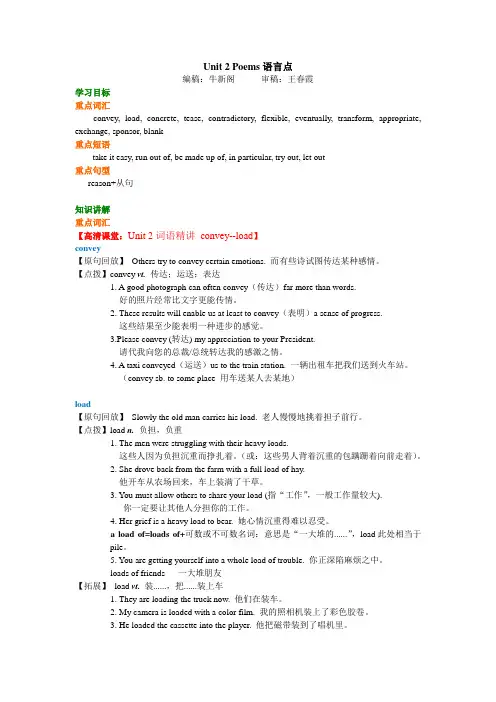
Unit 2 Poems语言点编稿:牛新阁审稿:王春霞学习目标重点词汇convey, load, concrete, tease, contradictory, flexible, eventually, transform, appropriate, exchange, sponsor, blank重点短语take it easy, run out of, be made up of, in particular, try out, let out重点句型reason+从句知识讲解重点词汇【高清课堂:Unit 2词语精讲convey--load】convey【原句回放】Others try to convey certain emotions. 而有些诗试图传达某种感情。
【点拨】convey vt.传达;运送;表达1. A good photograph can often convey(传达)far more than words.好的照片经常比文字更能传情。
2. These results will enable us at least to convey(表明)a sense of progress.这些结果至少能表明一种进步的感觉。
3.Please convey (转达) my appreciation to your President.请代我向您的总裁/总统转达我的感激之情。
4. A taxi conveyed(运送)us to the train station. 一辆出租车把我们送到火车站。
(convey sb. to some place 用车送某人去某地)load【原句回放】Slowly the old man carries his load. 老人慢慢地挑着担子前行。
【点拨】load n. 负担,负重1. The men were struggling with their heavy loads.这些人因为负担沉重而挣扎着。
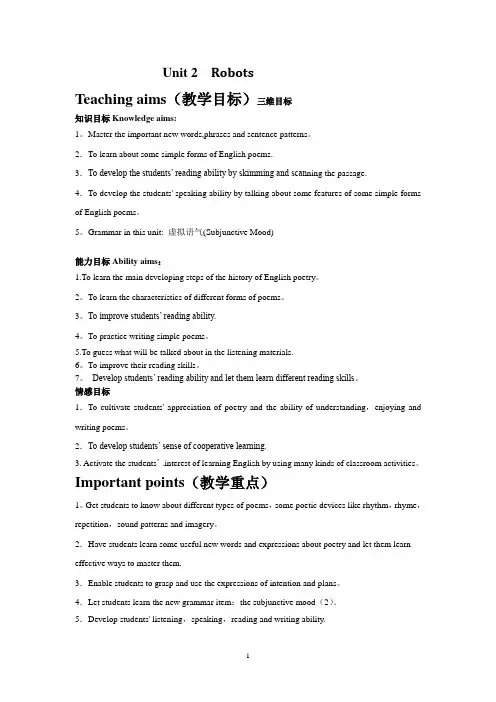
Unit 2 RobotsTeaching aims(教学目标)三维目标知识目标Knowledge aims:1。
Master the important new words,phrases and sentence patterns。
2.To learn about some simple forms of English poems.3.To develop the students’ reading ability by skimming and scan ning the passage.4.To develop the students' speaking ability by talking about some features of some simple forms of English poems。
5。
Grammar in this unit: 虚拟语气(Subjunctive Mood)能力目标Ability aims:1.To learn the main developing steps of the history of English poetry。
2。
To learn the characteristics of different forms of poems。
3。
To improve students’ reading ability.4。
To practice writing simple poems。
5.To guess what will be talked about in the listening materials.6。
To improve their reading skills。
7。
Develop students’ reading ability and let them learn different reading skills。
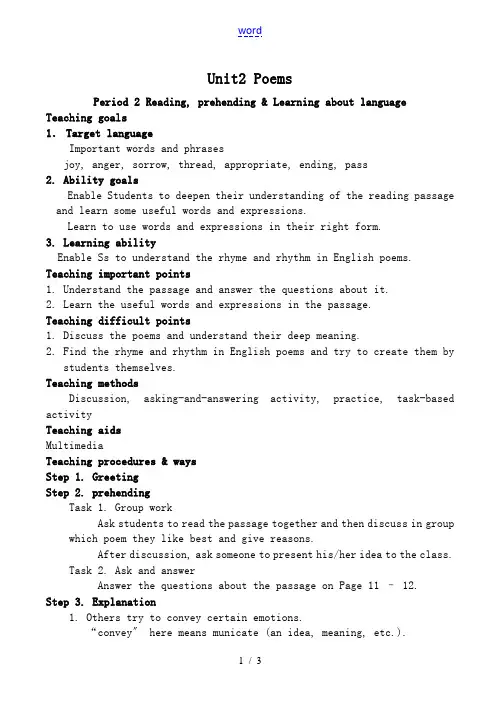
Unit2 PoemsPeriod 2 Reading, prehending & Learning about language Teaching goals1.Target languageImportant words and phrasesjoy, anger, sorrow, thread, appropriate, ending, pass2. Ability goalsEnable Students to deepen their understanding of the reading passage and learn some useful words and expressions.Learn to use words and expressions in their right form.3. Learning abilityEnable Ss to understand the rhyme and rhythm in English poems. Teaching important points1.Understand the passage and answer the questions about it.2.Learn the useful words and expressions in the passage.Teaching difficult points1.Discuss the poems and understand their deep meaning.2.Find the rhyme and rhythm in English poems and try to create them bystudents themselves.Teaching methodsDiscussion, asking-and-answering activity, practice, task-based activityTeaching aidsMultimediaTeaching procedures & waysStep 1. GreetingStep 2. prehendingTask 1. Group workAsk students to read the passage together and then discuss in group which poem they like best and give reasons.After discussion, ask someone to present his/her idea to the class.Task 2. Ask and answerAnswer the questions about the passage on Page 11 – 12.Step 3. Explanation1.Others try to convey certain emotions.“convey〞 here means municate (an idea, meaning, etc.).I can’t convey how angry I feel.“emotion〞 means strong feelingLove and hatred are basic emotions.His voice was shaking with emotion.2.They delight small children because they have strong rhythm andrhyme.“delight〞 means make sb. pleased greatly.The gift of the child delighted his parents.I am delighted to help you.“rhythm〞 means a measured flow of words and phrases in verse determined by various relations of syllables.the exciting rhythms of African drum music“rhyme〞 means identity for sound between words or the endings of words, esp. in verse.Shakespeare sometimes wrote in rhyme.He made up funny rhymes to make us laugh.3.We would have won if we hadn’t taken it easy.“take it easy〞 means to proceed gently or carefully; to relax and avoid overwork.You’ve done quite enough work for today; now take it easy for an hour.4.We would have won if we hadn’t run out of energy.“run out(of sth.)〞 means to use up; to e to an end.The petrol is running out.We are running out of out time. = Our time is running out.5. a poem made up of five lines“make sth. up〞 means to put together; to poundWhat are the qualities that make up his character?Society is made up of people of widely differing abilities.Step 4. Learning about languageCheck the exercise on Page 12-13.Task 1. Discovering useful words and expressions1.Ask some students to list the words they find to rhymes with the wordsin the exercise. The teacher may make some addition if necessary.2.plete the passage using the correct words.Ask students to finish the passage and explain why the form of the words must be changed.Task 2. Discovering useful structures1.Rewrite the poem about winning the match and the reasons.2.Rewrite the poem about the attempt to win the petition.Offer students some time to discuss about it and present some samples for them to follow if they find it difficult to get through.3.Match the sentences.Explain some rules of subjunctive mood if necessary.4.plete the sentences using the correct forms of the verbs.Step 5. Using words and expressions(Workbook)Task 1. Make adjectives from nouns by adding suffix “ful〞 and then explain the meaning of the new adjectives. Encourage students to think of more examples that have the same form.Task 4. Match the phrases appropriately and encourage students to create more of their own word pictures.Step 6. Make a short summary of this period.Homework1.Remember important language points.2.Write a simple English poem by using rhyme and rhythm.3.Preview “Learning about language〞.。
课本知识点详解:选修6Unit2(人教版)高二|课本知识点详解:选修6Unit2(人教版)Unit2 PoemsⅠ. 常考单词必背1.convey vt. 传达;运送I can't convey my feelings in words.我无法用言语来表达我的情感。
[快速闪记](1) 同义词:carry,convey,transfer,transmit,transport(2) convey to将……运往〔送往〕(某地);把……传达给(某人)convey sth to sb 向某人表达/传递某物convey sb/sth from A to B 把某人或某物从A地运送到B地convey one's feelings/meanings 表达某人的感情/意思2.concrete adj. 具体的 n. 水泥;混凝土As we were leaving,we found that only minutes earlier an elderly woman had fallen over at the entrance and had hit her head on the concrete. 我们要离开的时候,发现就在几分钟前,一位老妇人在入口处跌倒了且其头部撞在了水泥地上。
3.flexible adj. 灵活的;易弯曲的;柔韧的Good job candidates must show a flexible approach to problems.优秀的求职人员必须表明自己能以灵活的方法解决问题。
4.tease v.取笑;招惹;戏弄Don't take what he said seriously;he was only teasing.别拿他的话当真,他不过是开玩笑。
5.eventually adv. 终于;最后eventual adj. 最后的;最终的At the moment the building is empty,but eventually there will be a five-star hotel.目前这座建筑物是空的,但这儿最终将会成为一个五星级宾馆。